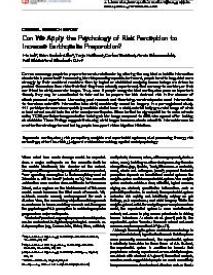Can We Apply the Psychology of Risk Perception to Increase Earthquake Preparation?
Can we encourage people to prepare for a natural disaster by altering the way that scientific information about risk is presented? In assessing the risk posed by a particular hazard, people tend to be guided more strongly by their emotional reactions than by logical or statistical analysis; human beings are driven to protect themselves from risks that that they have actually experienced, that are easy to envision, or that are linked to vivid, concrete images. Thus, even if people recognize that earthquakes pose an important threat, they may be unmotivated to take action to prepare for this abstract risk in the absence of direct personal experience. Harnessing past research and theorizing, we developed a novel intervention to transform scientific information into vivid, emotionally evocative imagery. In a pre-registered study, 411 participants were shown publicly available statistics or a vivid, scientifically-grounded image of what a local school would look like after a major earthquake. When invited to sign a petition to make schools safer, 77.3% participants agreed after looking at the image compared to 68% who agreed after looking at statistics. These findings suggest that using vivid images to communicate scientific information can be an effective strategy for motivating people to support risk mitigation initiatives.
Geachte bezoeker,
De informatie die u nu opvraagt, kan door psychotraumanet niet aan u worden getoond. Dit kan verschillende redenen hebben,
waarvan (bescherming van het) auteursrecht de meeste voorkomende is. Wanneer het mogelijk is om u door te verwijzen naar de bron
van deze informatie, dan ziet u hier onder een link naar die plek.
Als er geen link staat, kunt u contact opnemen met de bibliotheek,
die u verder op weg kan helpen.
Met vriendelijke groet,
Het psychotraumanet-team.
In: Collabra: Psychology ISSN: 2474-7394 | 5 | 1 | 47
https://www.collabra.org/article/10.1525/collabra.238/


